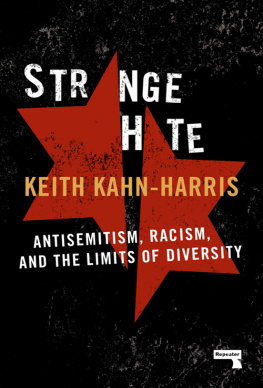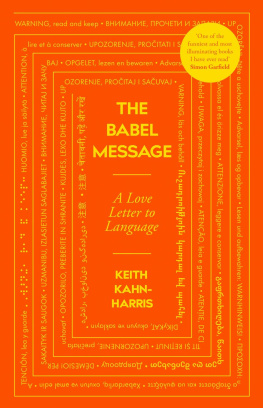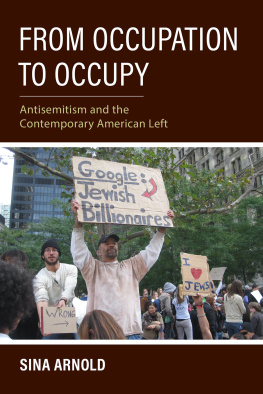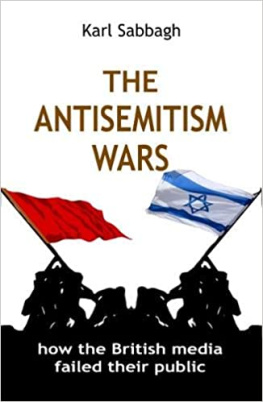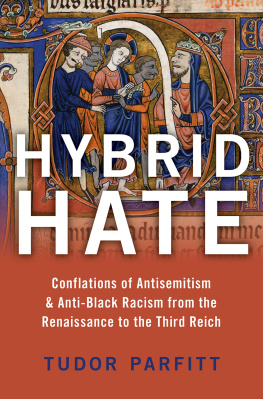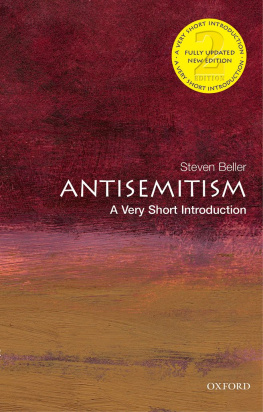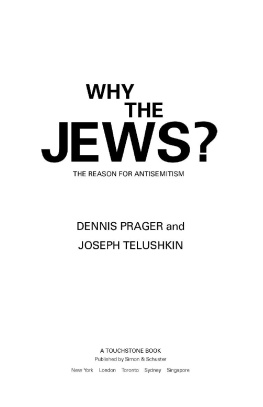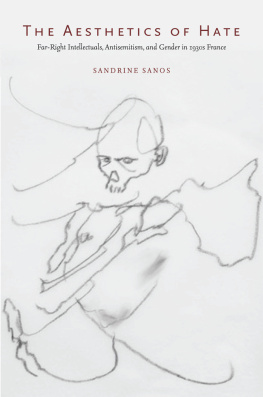Strange Hate:
Antisemitism, Racism and the Limits of Diversity
Strange Hate:
Antisemitism, Racism and the Limits of Diversity
Keith Kahn-Harris
CONTENTS
Chapter One:
What on Earth Is Going On?
Chapter Two:
How Antisemitism and Racism Became Unspeakable
Chapter Three:
How The Jews Ruined Antisemitism
Chapter Four:
The Chosen Ones
Chapter Five:
Whom Should We Listen to Now?
Chapter Six:
How To Cope with Diversity
Conclusion:
Paradise Regained
PREFACE
Humans, Politics and Identities
This is an infuriating book, about an infuriating phenomenon produced by the most infuriating beings there are human beings.
I talk a lot about humans in this book. I am one of course, so I feel I can speak with some authority. My vision for humanity is pretty simple: Broadly speaking, I would prefer it if my fellow humans and I would avoid killing, torturing, enslaving and raping each other at the very least. Even better would be if we could find a way to ensure that we can live without persecution, structural disadvantage and abuse.
So far so bland. But Im under no illusions about what human beings are actually like. Broadly speaking, Im not a big fan of our species in general and of myself in particular. There are parts of myself and things that I have done that disgust me. I am full of rage and desire. Within me is a constant struggle between what Jewish theology calls the yetzer ha-tov and the yetzer ha-ra the good inclination and the bad inclination. Whether one balances the other out is for others to judge; I am certainly in no position to make that tally myself.
In wanting us to get along with each other, I am not calling for some kind of holy communion of our mutual yetzer tovim. If there is to be any chance to remake a world in which we can let go of our human tendency to abuse, it has to account for our dark, unlikeable inclinations. That means acknowledging that we will not only dislike others, we will hate them too. This is, in my view, ineradicable a permanent fact. Somehow, we have to find a way to get along with people we hate.
I doubt that, outside of eschatological theology, many people think that hate can be abolished. What is much more common though, is the hope that we may be able to abolish hatred of entire categories of people and restrict our hatred to individuals as individuals. Many us yearn to eradicate hatred of the entire membership of religious, ethnic, national, sexual and other groups. The challenge we face is coming to terms with identity, the human tendency to attach themselves or others to something bigger than themselves, and the frequent tendency of humans to be suspicious of or opposed to those holding other identities. Eradicating identity-based hate requires, in some views, reconciliation, dialogue and empathy between holders of different identities. Alternatively, or perhaps simultaneously, eradicating identity-based hate may mean uncompromising opposition to the haters, marginalising them, even fighting them. Others would argue that it is the identities that are the problem and that if we relate to individuals as individuals, we will then begin to see them as humans with whom we can coexist.
As a sociologist, I see group identities as social facts. I am agnostic as to whether they are essential to us as humans, but I find it very hard to envisage a time when we will be entirely free of them, whether we would wish that or not. We are bound into group identities even if we refuse them, even when we assert our utter individual uniqueness. It is certainly possible and desirable to treat identity as more open, fluid and syncretic non-essentialist both intellectually and as a practice. Yet while we may be able to control how and whether we personally identify with a particular group, we can rarely control whether other people will identify us with it. And whilst a world in which no one identifies as anything other than themselves seems to be out of reach, even if we could reach it this would endanger the possibilities for nurturance and community between those who see each other as alike.
I am also pessimistic as to whether we can abolish hatred of other groups, although we can certainly go much further along the road towards doing so than we have so far. The reason for this is that there is one facet of identity that presents the greatest impediment to getting along and is often (although definitely not always) part of the identity package. That facet of identity is the political viewpoints, visions for the future, projects and ideologies. Members of religions, ethnic groups and nations often have a tendency not just to share a particular kind of politics but also to see it as an inextricable part of their identity. That doesnt mean that all members of a group share the same politics, but they may share the conviction that their politics is an integral feature of the identity they carry. For example, both Zionist and anti-Zionist Jews may see their stance on Zionism as rooted in Jewish history, tradition and ideals.
This presents a massive problem. Ideally, the political is always contestable; indeed its contestability is what should define it. Yet to contest some forms of politics inevitably means contesting group identities. And however much we might wish to get along with bearers of diverse identities, it surely asks too much that we abjure any kind of criticism of the politics that they bring with them.
A significant proportion of this book discusses one example of the consequences of not recognising the inextricable linkage between politics and identity. Many but not all Jews today are Zionists in some shape or form. Zionism is a political ideology. When Zionism and the legitimacy of the state of Israel are attacked, many Jews experience this as antisemitism. Those doing the attacking usually find this incomprehensible at the very least. For the most part they do not see themselves as attacking Jews only their politics indeed, they may see themselves as defenders of Jews against hatred.
As I will argue, controversies over Jews, Israel, Zionism and antisemitism raise much broader questions about anti-racism and the politics of diversity. The refusal to acknowledge or accept the fact that identities are often political identities has contributed to a growing selectivity in choosing which groups to defend or damn.
The solution (if it can be called that) that I offer, will not be one of reconciliation. Rather, I will suggest an anti-racist politics predicated on acknowledging the hatefulness of others. I will stare into the abyss and try and formulate a way of living with diversity that accepts that a slice of that diversity will be hateful to even the most convinced anti-racist. I will also try and reconstruct a form of politics that is appropriate to the challenge diversity poses.
Some might accuse me of excessive pessimism and of underestimating the human capacity to maintain relationships with others across the widest divides, political or otherwise. I accept the good faith of those who make this criticism. While I am indeed highly sceptical of whether the knot of politics and group identities can ever be unpicked, if there is any chance that it can happen, it will require at the very least a recognition that they exist for now. If humans are ever to break free of seeing their politics as part of their group identities, then it will have to come about through a free choice, rather than compulsion.
What I call in this book selective anti/racism has emerged as a response to the knot of politics and group identity. The fact of inconvenient political identities has made it too difficult for anti-racists to be universally anti-racist. Conversely, racists have discovered that they could leaven their racism, and even indemnify themselves against accusations of racism, through reaching out to politically convenient others.
Next page
